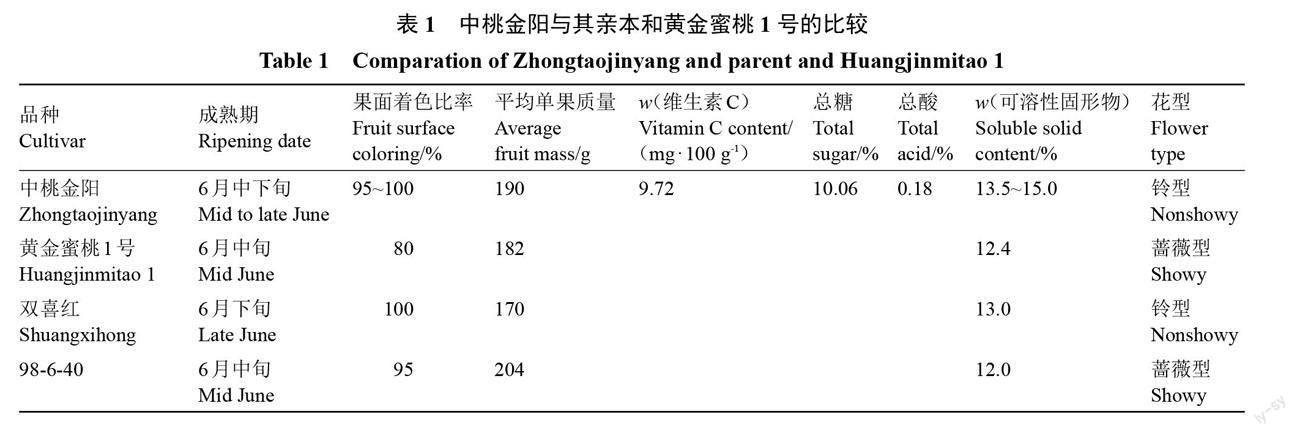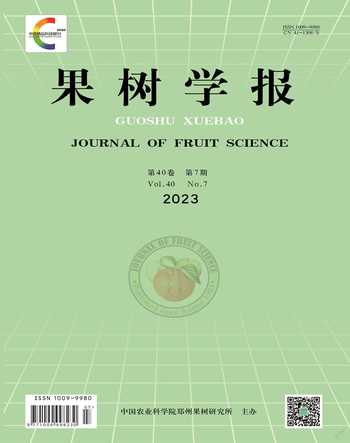早熟黄肉桃新品种中桃金阳的选育
方伟超 王力荣 陈昌文 朱更瑞 曹珂 王新卫 吴金龙



摘 要:中桃金陽是1998年用五月魁自然实生获得优良单株98-6-40,2008年选用98-6-40为母本、黄肉油桃品种双喜红为父本,进行人工杂交培育而成的早熟黄肉桃新品种。2017年正式命名,2021年通过河南省林木品种审定委员会审定。果实圆形,两半部对称,果顶平,梗洼浅,缝合线浅,成熟状态一致;平均单果质量190 g,大果质量250 g;果皮茸毛短,底色黄,果面95%以上着红色;果肉黄色,果肉与近核处花青苷含量较少,肉质为硬溶质;果实风味甜,可溶性固形物含量(w)13.5%~15.0%,黏核。树势健壮,树姿半开张;叶片长椭圆披针形;花为铃型,花色粉红,花粉多,自花结实。郑州地区3月初叶芽膨大,3月下旬始花,6月中下旬果实成熟,果实生育期85 d左右。落叶终止期11月10日左右,全生育期260 d。可在黄河故道地区广泛栽培。
关键词:桃;新品种;中桃金阳;早熟;黄肉
中图分类号:S662.1 文献标志码:A 文章编号:1009-9980(2023)07-1490-04
Breeding of a new early-ripening and yellow-fleshed peach cultivar Zhongtaojinyang
FANG Weichao,WANG Lirong,CHEN Changwen,ZHU Gengrui,CAO Ke,WANG Xinwei,WU Jinlong
(Zhengzhou Fruit Research Institute, Chinese Academy of Agricultural Sciences, Zhengzhou 450009, Henan, China)
Abstract: Zhongtaojinyang is an early ripening peach, derived from a cross between 98-6-40 and Shuangxihong in 2008 at the experimental field. The female parent 98-6-40 is an early-ripening yellow peach, which derived from Maygrand by open pollination in 1998. Shuangxihong, the pollen donation, is a yellow-fleshed nectarine. Zhongtaojinyang was first selected in 2011 for its large fruit, beautiful appearance, yellow and hard flesh, early ripening and high yield. It passed the final election, was named in 2017, and approved by Henan Forest Variety Certification Committee in 2021. The leaf shape is long lliptic-lanceolate, with 14.16 cm in length and 3.78 cm in width and 0.8 cm petiole, which has about 2 to 3 reniform leaf glands. The flowers are less showy and dark pink. Under normal cultivation conditions, the average fruit weight is 190 g, and the maximum fruit weight is 250 g. Fruit is mainly round with two symmetrical halves, and also has a flat top with shallow cavity and the suture, and consistent mature state. The peel has beautiful bright red color covering approximately 95% fruit surface area with yellow background and short fuzz. Its flesh is yellow and firm texture. The peel cannot be peeled, and the core is clingstone. The flavor is fragrant and sweet, with a soluble solids content of 13.5%-15.0%. It is self-fertile and its yield is relatively stable through the experiments in Wenxian, Xinxiang and Xihua county of Henan province, and Mengyin county of Shandong province. The experiment results also show that under the condition of strictly flower and fruit thinning, the cultivar exhibits large fruits and high soluble solids content, and the quality is more excellent. In Zhengzhou, situated in the middle of China, the first flower of Zhongtaojinyang comes into bloom in late March. Fruits ripen in mid to late June, about 85 d after blooming. The termination period of fallen leaves is in mid-November, and the full growth period is 260 days. Compared with the current main planting variety Huangjinmitao 1 that has yellow flesh and matures in mid-June, Zhongtaojinyang fruit ripens about 7-10 d later and has larger size. The tree of Zhongtaojinyang has a strong tree vigor, and a special attention should be paid to control the tree vigor during cultivation; Y-shape system can be adopted, with a ridge height of 2.0 m and a ridge width of 4.0-5.0 m. It is necessary to properly control the fertilizer and water and avoid flood irrigation. The fruit setting rate of this variety is very high, it is necessary to increase the intensity of thinning flowers and fruits, and the distance between fruits should be greater than 15.0-20.0 cm. The appearance of fruit is very beautiful, and it can be cultivated without bags. However, in areas with heavy rain in the south, there is a phenomenon of cracked fruits, and bagging cultivation is recommended. The bagging time is generally carried out after the fruit is set when the fruit development enters the stone hardening stage, and the insecticide and fungicide need to be sprayed before the bagging. The fruit has a moderate hardness, which needs to be harvested in a timely manner, and the whole cold chain transportation is better.
Key words: Peach; New cultivar; Zhongtaojinyang; Early-ripening; Yellow flesh
黄肉桃营养价值高,富含维生素C、抗氧化剂和膳食纤维[1-2]。近些年来,随着社会经济发展,人民群众生活水平大幅度提高,越来越多的人将对果品的关注集中到营养和健康上,香甜可口、类胡萝卜素含量丰富[3]的黄肉桃深受消费者喜爱。中国、日本和韩国等逐渐转向黄肉桃类型的品种选育,并有迅速发展的趋势[4]。我国育种工作者先后育成了黄金蜜桃1号、黄金蜜桃3号、金陵黄露、锦香等优良黄肉桃系列品种[5-7]。中国农业科学院郑州果树研究所为选育大果、早熟、黄肉的普通桃新品种,满足消费市场多元化的需求,经过十几年的工作,选育出黄肉普通桃新品种——中桃金阳。
1 选育过程
1998年7月下旬采集自然授粉的五月魁(May Grand)的种子,经2~4 ℃低温层积处理,9月下旬播种至温室营养钵内,进行温室生长培养。1999年4月将苗木带基质移栽入田间培养。2002年结果,其中单株98-6-40性状表现优良,确定为优良单株。2008年以98-6-40为母本、油桃品种双喜红为父本进行杂交(图1)。同年6月中旬果实成熟期,取出种胚,消毒后接种于灭菌的培养基中,经2~4 ℃低温层积处理,待种胚子叶张开,移至温室出苗,出芽高度为3~4 cm时,炼苗后移栽至营养钵中,进行温室生长培养,2009年4月将苗木带基质移入到田间培养畦内,按0.5 m×4.0 m双行种植在温县基地。2011年开始结果,其中单株08-11-76果实为黄肉普通桃,6月中下旬成熟,外观漂亮,果实大,单果质量190 g,大果250 g,肉质硬,风味甜,丰产。连续3 a(年)观察,性状表现稳定。2013年9月采集其枝条分别在河南省温县、新乡县和西华县,山东省蒙阴县区域试验点进行高接,2015—2020年连续6 a进行调查,各高接株果实经济性状、丰产性、生长结果习性等表现稳定。与对照品种黄金蜜桃1号比较,成熟期较黄金蜜桃1号晚熟7~10 d,果实外观近全红,更加靓丽。2017年命名为中桃金阳(图2),2021年通过河南省林木品种审定委员会审定(良种编号:豫 S-SV-PP-002-2021)。
2 主要性状
2.1 果实经济性状
果实圆形,两半部对称,果顶平,梗洼浅,缝合线明显、浅,成熟状态一致;平均单果质量190 g,大果质量250 g;果实表面茸毛短,底色黄,成熟时果面95%以上着红色晕;果肉黄色,硬溶质,果肉与近核处花青苷含量较少,汁液中多,风味甜,可溶性固形物含量(w,后同)13.5%~15.0%,总糖含量10.06%,总酸含量0.18%,维生素C含量9.72 mg·100 g-1,品质优。黏核(表1)。
2.2 植物学特征
树势健壮,树姿半开张,乔化;1年生枝皮色暗红,节间长度2.65 cm;叶片长14.16 cm,宽3.78 cm,呈长椭圆披针形,叶柄长0.80 cm,叶腺肾形;叶色绿色,叶基楔形,叶尖渐尖;花为铃型,花色粉红,花瓣5枚,花药橘红色,花粉多,萼筒内壁橙黄色。
2.3 生长结果习性
长、中、短果枝均能结果,其中长果枝占34.95%,中果枝占41.46%,短果枝占16.26%,徒长性结果枝7.31%,徒长性结果枝长放时仍能结果。复花芽居多,占88.90%,花芽起始节位低,为第1~2节,自花可以结实,进入结果期早,一般定植第2年开始结果,并易早期丰产。采用2 m×5 m株行距栽植,两主枝自然开心形整形,4年生树平均株产33.2 kg,产量比较稳定。
2.4 物候期
郑州地区3月初叶芽膨大,3月下旬始花,开花持续期约7 d。6月中下旬果实成熟,果实生育期85 d左右。落叶终止期11月10日左右,全生育期260 d。
3 栽培技术要点
3.1 高标准建园
应选择阳光充足、土层深厚、土质疏松、排水良好的地块种植。中桃金阳喜中性偏酸土壤,pH以4.5~7.5为宜,但以5.7~6.5为最好。地下水位最好在1 m以下,水位过高时,要起垄做高畦。种植株行距一般为2.0 m×4.0 m、2.0 m×5.0 m,或3.0 m×4.0 m。根据行距开挖宽、深各80 cm左右的定植沟,沟中可填充秸秆、粪肥等,以提高土壤有机质含量。
3.2 整形修剪
整形方式常采用两主枝自然开心形。推荐采用长梢修剪,减少冬季修剪量。主枝开张角度应适当偏小,一般两主枝夹角为60°~70°,以防主枝开张角度过大时被果实压平或下垂影响产量、品质。幼树在培养主枝时,注意先放后缩,放缩结合,防止主枝中下部衰弱光秃。延长枝头要多疏少截,冬剪多留健壮的长果枝,疏除细弱的短、小果枝。夏季修剪主要是疏除直立徒长枝及过密的新梢。
3.3 果实管理
中桃金阳成花容易,坐果率高,为保证果实质量,须严格疏花疏果。疏花时,将长果枝基部10 cm左右的花蕾全部疏除,留枝条上下侧的花蕾。疏果时,先疏除畸形果、病虫果,再疏过密果、小果,使果间距保持15~20 cm。采用长枝修剪时,留长果枝中上部果,疏除下部果,长果枝留3个果,中果枝留2个果,短果枝、花束状枝留1个果或不留。
3.4 肥水管理
提倡秋施基肥,一般每666.7 m2 施腐熟有机肥5~8 m3。为提高果实品质,可以在果实成熟前30 d,每株施2~4 kg腐熟的饼肥,结合叶面喷施2次0.3%硫酸钾,间隔10 d 左右,以生产出外观艳丽、风味浓郁的高档果实。
3.5 病虫害防控
在花芽膨大期,应喷洒石硫合剂,以降低介壳虫及一些真菌类的侵害。在花前可喷施1~2次可立施(氟啶蟲胺腈)加螺虫乙酯防治蚜虫。立秋后要注意潜叶蛾等的危害。
參考文献 References:
[1] 刘燕德,吴明明,孙旭东,朱丹宁,李轶凡,张智诚. 黄桃表面缺陷和可溶性固形物光谱同时在线检测[J]. 农业工程学报,2016,32(6):289-295.
LIU Yande,WU Mingming,SUN Xudong,ZHU Danning,LI Yifan,ZHANG Zhicheng. Simultaneous detection of surface deficiency and soluble solids content for Amygdalus persica by online visible near infrared transmittance spectroscopy[J]. Transactions of the Chinese Society of Agricultural Engineering,2016,32(6):289-295.
[2] 许建兰,马瑞娟,俞明亮,张斌斌,宋宏峰,沈志军,周懋. 早熟鲜食黄肉桃新品种‘金陵黄露的选育[J]. 果树学报,2016,33(10):1324-1327.
XU Jianlan,MA Ruijuan,YU Mingliang,ZHANG Binbin,SONG Hongfeng,SHEN Zhijun,ZHOU Mao. A new early ripening peach cultivar ‘Jinlinghuanglu[J]. Journal of Fruit Science,2016,33(10):1324-1327.
[3] LAYNE D R,BASSI D. The peach:Botany,production and uses[M]. Wallingford:CABI,2008:17.
[4] ROBERTSON A J,HORVAT R J,LYON B G,MEREDITH F I,SENTER S D,OKIE W R. Comparison of quality characteristics of selected yellow and white- fleshed peach cultivars[J]. Journal of Food Science,1990,55(5):1308-1311.
[5] 鲁振华,牛良,崔国朝,潘磊,曾文芳,王志强. 早熟黄肉桃新品种‘黄金蜜桃1 号的选育[J]. 果树学报,2020,37(9):1434-1436.
LU Zhenhua,NIU Liang,CUI Guochao,PAN Lei,ZENG Wenfang,WANG Zhiqiang. An early ripening and yellow flesh peach variety‘Huangjinmitao 1[J]. Journal of Fruit Science,2020,37(9):1434-1436.
[6] 牛良,鲁振华,崔国朝,曾文芳,潘磊,王志强. 黄肉鲜食桃品种‘黄金蜜桃3 号的选育[J]. 果树学报,2018,35(10):1297-1300.
NIU Liang,LU Zhenhua,CUI Guochao,ZENG Wenfang,PAN Lei,WANG Zhiqiang. ‘Huangjinmitao 3,a new yellow-fleshed fresh peach cultivar[J]. Journal of Fruit Science,2018,35(10):1297-1300.
[7] 叶正文,苏明申,张学英,庄恩及,吴钰良. 早熟黄桃新品种锦香的选育[J]. 果树学报,2005,22(4):434-435.
YE Zhengwen,SU Mingshen,ZHANG Xueying,ZHUANG Enji,WU Yuliang. Jinxiang,a new early ripening yellow peach variety[J]. Journal of Fruit Science,2005,22(4):434-435.

